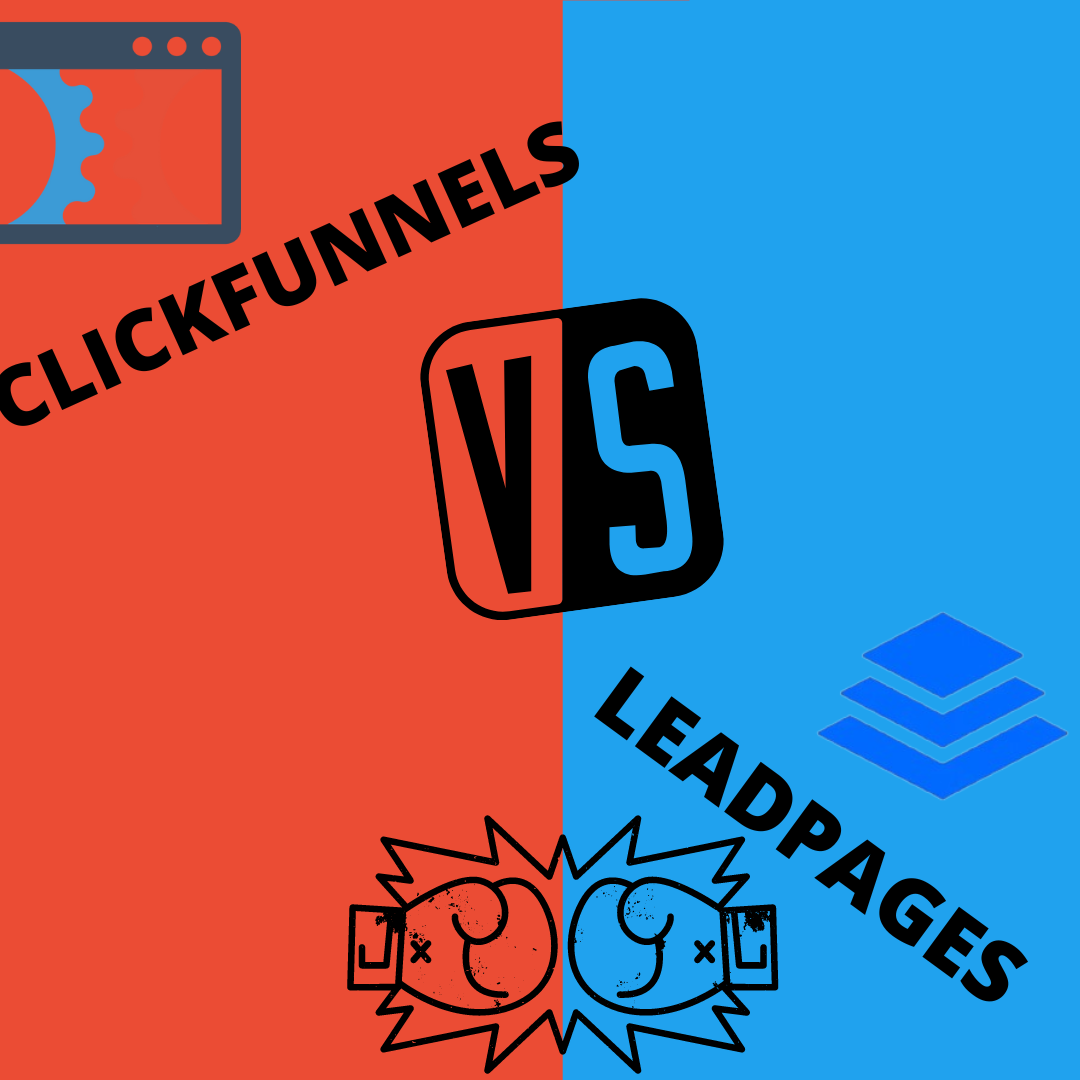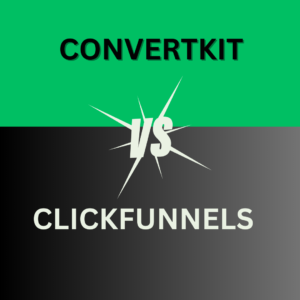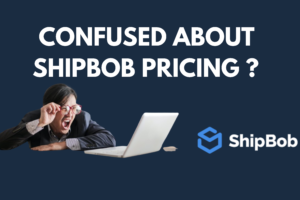In the digital marketing world, the debate between ClickFunnels vs LeadPages is a hot topic among entrepreneurs and business owners looking to boost their online presence. Choosing the right landing page builder and sales funnel creator can significantly impact your online marketing strategy and overall business growth. Both ClickFunnels and LeadPages offer robust solutions for creating landing pages and sales funnels, but they cater to different needs and preferences.
This blog post delves into a comprehensive comparison of ClickFunnels vs LeadPages, covering everything from ease of use and design flexibility to pricing and customer support. Whether you’re a seasoned marketer considering a switch or a newcomer trying to make an informed decision, this guide aims to provide you with all the information you need to choose the platform that best fits your business goals.
Join us as we explore the key features, pros and cons, and nuanced differences between these two powerhouse tools. By the end of this post, you’ll have a clear understanding of which platform—ClickFunnels or LeadPages—is the right choice for optimizing your landing pages and sales funnels, setting the stage for enhanced lead generation and conversion rates.
Table of Contents
Clickfunnels vs Leadpages Round 1 -Ease of Use
When comparing ClickFunnels vs LeadPages, ease of use is a critical factor for anyone looking to streamline their digital marketing efforts without a steep learning curve. Both platforms offer unique benefits, but their approaches to user experience and design simplicity can vary significantly, impacting how quickly you can get your landing pages and sales funnels up and running.
ClickFunnels prides itself on being an all-in-one sales funnel builder. It guides users through the process of creating various types of marketing funnels, from lead capture pages to sales pages and even webinar funnels. The drag-and-drop editor is intuitive, allowing for easy customization without the need for extensive design or coding knowledge. However, the wealth of features and options can initially overwhelm new users, but this complexity is a trade-off for the platform’s versatility.
LeadPages, on the other hand, emphasizes simplicity and speed. It is designed for creating landing pages quickly and efficiently, with a straightforward user interface that makes it easy for beginners to navigate. The template selection process is streamlined, and customizing those templates is a straightforward process. LeadPages may lack the depth of funnel-building features found in ClickFunnels, but it compensates with its ease of use, making it ideal for users primarily focused on building landing pages rather than full sales funnels
Clickfunnels vs Leadpages Round 2 -Template Design and Flexibility
When comparing ClickFunnels vs LeadPages, one of the most critical aspects to consider is the template design and flexibility. Both platforms offer a range of templates to help users create engaging landing pages, but they cater to different preferences and needs.
ClickFunnels provides a wide array of templates specifically designed to support sales funnels. These templates are not just about aesthetics; they’re crafted to guide visitors through a sales process, from awareness to purchase. The platform offers a variety of funnel templates, including sales pages, opt-in pages, and thank-you pages, among others. What sets ClickFunnels apart is its emphasis on conversion optimization. Each template is tested for performance, ensuring users have access to designs proven to convert. However, when it comes to customization, while ClickFunnels allows for significant alterations, the interface might be a bit overwhelming for beginners. Advanced users, though, will appreciate the depth of customization available, allowing for a tailored funnel that matches specific branding needs.
LeadPages, on the other hand, shines in the sheer variety and design aesthetics of its templates. It offers a broader selection of templates for various purposes, not limited to sales funnels. Whether you’re looking to create a simple landing page, a webinar registration form, or a lead capture page, LeadPages likely has a design for you. The platform is renowned for its user-friendly drag-and-drop editor, making template customization accessible to users of all skill levels. LeadPages templates are highly customizable, enabling users to easily adjust colors, fonts, and layout elements to match their brand identity. The emphasis is on creating beautiful, responsive pages that look professional and engage visitors
Clickfunnels vs Leadpages Round 3 -Features and Functionality
ClickFunnels is renowned for its comprehensive suite of features designed to facilitate the creation of sales funnels. It offers a wide range of tools that support various stages of the sales process, from lead capture to final sale. Key features include:
- Sales Funnel Builder: Allows users to create complex sales funnels with multiple steps, including upsells, downsells, and order bumps.
- A/B Testing: Users can test different landing pages and funnels to optimize conversions.
- Email Autoresponder Integration: Seamlessly integrates with popular email marketing tools, enabling automated follow-up emails.
- Affiliate Management: Comes with a built-in affiliate management system to help users recruit and manage affiliates.
LeadPages Features:
LeadPages focuses more on landing pages and lead capture, offering a range of features tailored to businesses looking to increase their lead generation efforts. Its main features include:
- Landing Page Templates: Provides a vast library of high-quality, customizable templates designed for conversion.
- Drag-and-Drop Builder: Makes it easy to create and customize landing pages without needing coding skills.
- Lead Capture Tools: Includes pop-ups, alert bars, and embedded forms for effective lead capture.
- A/B Testing: Similar to ClickFunnels, LeadPages offers A/B testing to help optimize page performance.
Clickfunnels vs Leadpages Round 4 -Integrations
When evaluating ClickFunnels vs LeadPages, one of the critical factors to consider is the range and effectiveness of integrations each platform offers. Integrations are essential as they allow your landing page or sales funnel builder to seamlessly connect with other tools, enhancing your marketing efforts and streamlining your workflow.
ClickFunnels boasts a wide array of integrations with popular services and applications, enabling users to connect their sales funnels directly with tools for email marketing, payment processing, social media management, and customer relationship management (CRM), among others. Key integrations include major email marketing platforms like Mailchimp, ActiveCampaign, and ConvertKit; payment gateways such as PayPal and Stripe; and webinar platforms like Zoom. This extensive integration capability ensures that marketers can automate much of their sales and marketing processes, making ClickFunnels an all-in-one solution for building and optimizing sales funnels.
On the other hand, LeadPages also offers a robust set of integrations, focusing on maximizing the lead generation capabilities of your landing pages. LeadPages integrates with a variety of tools for email marketing, analytics, CRM, and e-commerce, including Shopify for online sales, Google Analytics for tracking page performance, and HubSpot for CRM. While LeadPages may not offer as broad a spectrum of sales funnel integrations as ClickFunnels, its focus on lead capture and conversion tools makes it a powerful platform for businesses looking to generate and nurture leads effectively.
Clickfunnels vs Leadpages Round 5 -Sales Funnel Creation and Optimization
When it comes to building and optimizing sales funnels, the choice between ClickFunnels and LeadPages is crucial for marketers and entrepreneurs seeking to maximize their online sales and conversion rates. Understanding how each platform caters to the sales funnel creation process can help you decide which tool aligns best with your business goals.
ClickFunnels stands out for its comprehensive approach to sales funnel creation. Designed to manage every step of the sales process, ClickFunnels offers a wide array of funnel templates and types, including lead capture funnels, sales funnels, webinar funnels, and membership sites. Its drag-and-drop editor allows users to easily customize each step of the funnel without needing coding knowledge.
Key Features for Funnel Creation and Optimization:
- Pre-designed Funnel Templates: ClickFunnels provides numerous templates that are specifically tailored for different stages of the sales process, making it easier to set up a funnel that fits your product or service.
- A/B Testing: This feature allows you to test different versions of your landing pages, sales pages, and other funnel elements to determine which performs better in terms of conversions.
- Upsells and Downsells: Easily integrate upsell and downsell pages into your funnels, which can significantly increase the average transaction value.

LeadPages focuses on creating high-converting landing pages and lead capture forms, making it an excellent tool for the top of the sales funnel. While it may not offer as comprehensive a suite for funnel building as ClickFunnels, LeadPages excels in quickly deploying landing pages that convert visitors into leads or customers.
Key Features for Funnel Creation and Optimization:
- High-Converting Templates: LeadPages offers a variety of templates designed to capture leads and make sales, with a strong emphasis on conversion optimization.
- Lead Capture Tools: Features like pop-ups, alert bars, and opt-in texts are particularly effective for growing your email list and ensuring a steady stream of leads into your funnel.
- Integration Capabilities: Easily integrate with other marketing tools and platforms to manage your sales funnel effectively. This is particularly useful for businesses that rely on multiple tools for email marketing, CRM, and payment processing.
Clickfunnels vs Leadpages Round 6 -E-commerce Capabilities
In the realm of digital marketing, selecting the right landing page and sales funnel builder is crucial for e-commerce success. This brings us to the pivotal comparison of ClickFunnels vs LeadPages, specifically focusing on their e-commerce capabilities. Understanding how each platform caters to online sellers can help you decide which tool aligns best with your business goals.
ClickFunnels E-commerce Capabilities
ClickFunnels is renowned for its comprehensive suite of e-commerce features designed to convert visitors into customers. The platform offers an intuitive drag-and-drop builder that simplifies the creation of custom sales funnels. Users can easily set up product pages, implement upsells and downsells, and integrate payment gateways such as PayPal and Stripe. ClickFunnels excels in creating seamless shopping experiences, from initial landing on the page to the final checkout process.
One of ClickFunnels’ standout features is its robust funnel templates specifically tailored for e-commerce. These templates are designed to guide visitors through a well-structured sales process, increasing the likelihood of purchase. Moreover, ClickFunnels supports membership sites, allowing for the sale of subscription-based products or services.
LeadPages E-commerce Capabilities
LeadPages, on the other hand, is primarily known for its landing page capabilities. However, it also offers features supportive of e-commerce activities. The platform allows for the easy creation of product pages and integrates with a range of payment gateways for smooth transaction processes. LeadPages is particularly effective for businesses looking to build high-converting landing pages for specific products or promotions.
Although LeadPages might not offer as extensive a set of e-commerce tools as ClickFunnels, it excels in lead generation and conversion optimization. For e-commerce businesses focused on capturing leads and nurturing them through email marketing or other channels, LeadPages provides an efficient solution. Its analytics features also help in optimizing landing pages for higher conversion rates.
Clickfunnels vs Leadpages Round 7 -Lead Capture and Conversion Tools
In the realm of digital marketing, lead capture and conversion are paramount for business growth. This brings us to a pivotal comparison: ClickFunnels vs LeadPages, two giants in the field known for their robust tools designed to convert visitors into leads and ultimately, customers. Understanding the differences and strengths of each can help marketers make informed decisions that align with their business goals.
ClickFunnels: A Comprehensive Funnel Builder
ClickFunnels excels in creating a seamless journey for potential customers. It’s not just about capturing leads; it’s about guiding them through a carefully crafted sales funnel that nurtures at every step. ClickFunnels offers a wide array of features like pop-ups, email integrations, and a plethora of landing page templates specifically designed to maximize conversions.
LeadPages: Specialized in Landing Pages
LeadPages focuses intensely on creating high-converting landing pages and offers a significant variety of templates and tools for lead capture, such as alert bars and embedded opt-in forms. Its strength lies in simplicity and efficiency, allowing users to quickly deploy landing pages optimized for conversion with minimal fuss.
Clickfunnels vs Leadpages Round 8 -Analytics and Reporting
When it comes to optimizing your digital marketing efforts, the importance of robust analytics and reporting cannot be overstated. In the comparison of ClickFunnels vs LeadPages, both platforms offer unique features that cater to different needs regarding tracking, analyzing, and reporting user interactions and conversion data. Understanding the nuances of each can help you choose the platform that aligns best with your business goals.
ClickFunnels Analytics
ClickFunnels provides comprehensive analytics that cover various aspects of your sales funnels. From the dashboard, you can access detailed reports on page views, conversions, and overall funnel performance. This data is crucial for understanding how visitors move through your sales funnel and where they might be dropping off. ClickFunnels’ analytics also extend to A/B split testing, allowing you to compare different versions of your pages to see which one performs better in terms of conversions.
One of the standout features of ClickFunnels is its ability to track each step of the customer’s journey, providing insights into not just the end conversion but also the effectiveness of each page within the funnel. This level of detail is invaluable for marketers looking to optimize their funnels for higher conversions.
LeadPages Analytics
LeadPages takes a slightly different approach to analytics, focusing heavily on real-time data and conversion insights for individual landing pages and LeadBoxes. The platform integrates seamlessly with Google Analytics and other third-party analytics tools, offering a deeper dive into website traffic and user behavior. LeadPages also provides an overview of how your pages are performing with regards to conversion rates, allowing for quick adjustments based on the most current data.
LeadPages excels in presenting data in an easy-to-understand format, making it particularly user-friendly for those who may not be as experienced in interpreting web analytics. The built-in conversion tools and analytics make it simple to see at a glance which pages are converting best, so you can replicate success across your campaigns
Clickfunnels vs Leadpages Round 9 – Pricing and Value for Money
When considering any digital marketing tool, pricing is often a pivotal factor, alongside the value it delivers for the investment. In this comparison of ClickFunnels vs LeadPages, we’ll dive into their pricing structures, what each plan offers, and evaluate their overall value for money. This analysis aims to provide a clear understanding to help you decide which platform is more cost-effective for your specific needs.
ClickFunnels Pricing
ClickFunnels offers a tiered pricing model designed to cater to businesses of varying sizes and needs. The basic plan typically starts at a monthly fee, offering access to the core funnel-building functionalities, including the ability to create a certain number of sales funnels and landing pages, and integrate with payment processors. Higher tiers provide additional features such as more funnels and pages, access to advanced back-end features, priority support, and access to training resources.
One of ClickFunnels’ standout offerings is its comprehensive ecosystem, which includes not just landing pages but also sales funnels, membership sites, and webinar hosting. This makes it a versatile tool for businesses looking to manage multiple aspects of their online marketing and sales processes in one place.
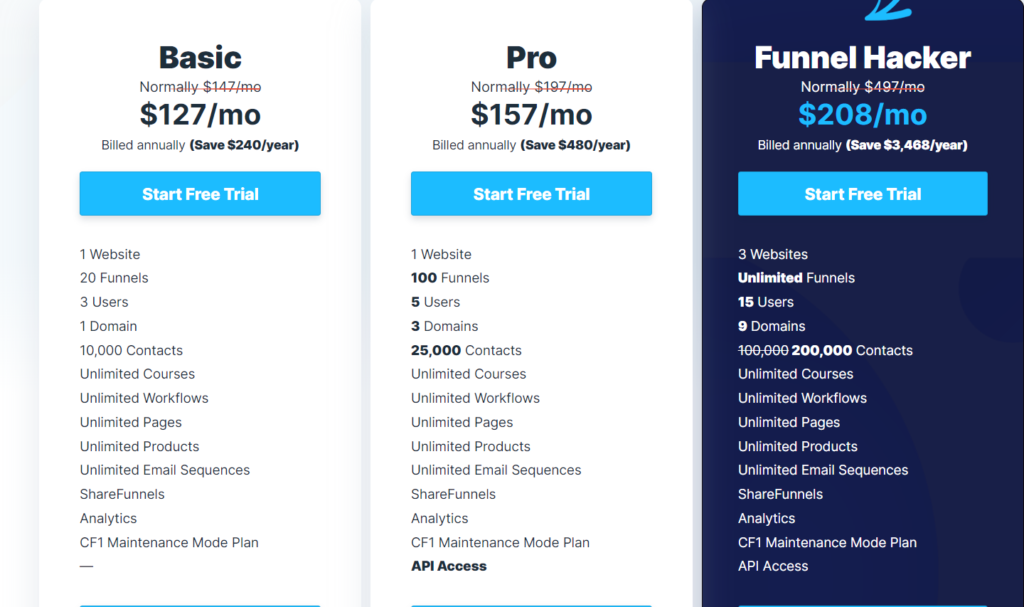
LeadPages Pricing
LeadPages, on the other hand, positions itself as a more affordable solution for creating landing pages and websites. Its pricing structure is also tiered, starting from a lower monthly fee for the basic plan, which includes unlimited landing pages, lead collection, and traffic, along with access to standard templates and integrations. Higher plans add advanced features like A/B testing, online sales and payments, and priority tech support.
LeadPages stands out for its focus on providing a high-quality, easy-to-use landing page builder at a competitive price point. It’s particularly appealing for small businesses and individual entrepreneurs who need a straightforward solution without the complexity of full sales funnels.
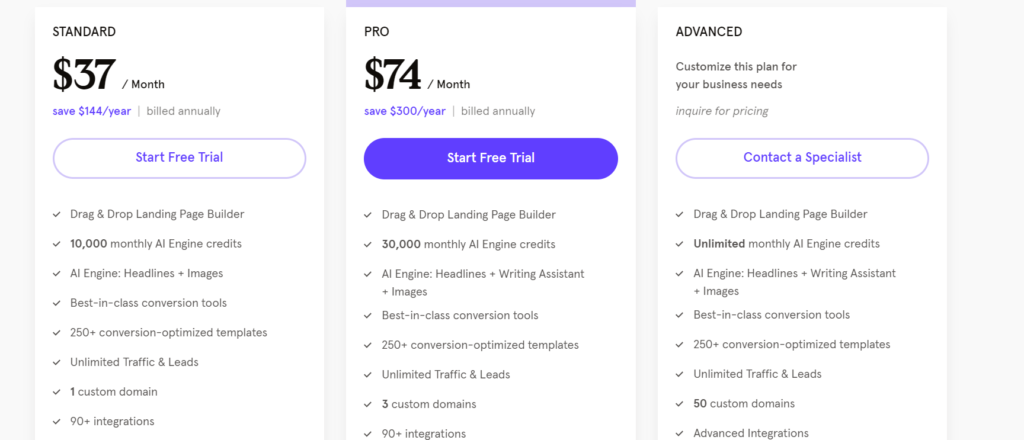
Value for Money
When comparing ClickFunnels vs LeadPages in terms of value for money, it’s important to consider your specific needs. ClickFunnels offers a broader range of features designed for comprehensive online marketing and sales, which can justify its higher price for businesses looking to leverage sales funnels, webinars, and membership sites. Its value is in its all-in-one functionality, reducing the need for multiple separate tools.
LeadPages, with its lower price point, provides exceptional value for users primarily focused on building high-converting landing pages and simple websites. Its ease of use and efficient design capabilities make it a cost-effective solution for those who do not require the extensive features that ClickFunnels offers.
Clickfunnels vs Leadpages Round 10 -Customer Support and Resources
When choosing between ClickFunnels and LeadPages, understanding the type of customer support and resources each platform offers can be crucial to your decision. This comparison aims to provide a detailed look at how ClickFunnels and LeadPages stack up in terms of customer support, educational resources, and community engagement.
ClickFunnels Customer Support and Resources
ClickFunnels prides itself on offering comprehensive support to its users. Customers can access a wide variety of support options including:
- 24/7 Live Chat Support: Immediate assistance is available around the clock, ensuring that help is always at hand whenever you might need it.
- Email Support: For less urgent queries, ClickFunnels offers email support with a promise of timely responses.
- Extensive Knowledge Base: ClickFunnels has a vast repository of articles, guides, and FAQs designed to help users navigate through any issues or questions they might have.
- ClickFunnels Community: The ClickFunnels Facebook group and forums are vibrant communities where users can share advice, strategies, and success stories.
- Training and Educational Resources: ClickFunnels offers a wealth of educational materials, including webinars, courses, and the ClickFunnels Academy, designed to help users maximize their use of the platform.
LeadPages Customer Support and Resources
LeadPages focuses on ensuring users have the support and resources they need to succeed, offering:
- Email and Chat Support: LeadPages provides support through both email and live chat, although it’s worth noting that live chat is only available during business hours.
- Knowledge Base: A comprehensive knowledge base is available, containing articles, video tutorials, and guides that cover every aspect of using LeadPages.
- LeadPages Community: The LeadPages community on Facebook is an active space for users to seek advice, share experiences, and connect with other entrepreneurs.
- Educational Resources: LeadPages offers webinars, workshops, and a blog filled with informative content aimed at helping users improve their marketing and landing page strategies.
Clickfunnels vs Leadpages Final Round -Security and Reliability
When comparing ClickFunnels vs LeadPages, two of the leading landing page platforms, security and reliability are paramount considerations for businesses aiming to protect their data and ensure uninterrupted service for their customers. Both platforms understand the importance of these factors and have implemented measures to address them, albeit in their unique ways.
ClickFunnels Security Measures:
ClickFunnels takes security seriously by implementing robust encryption standards, including secure sockets layer (SSL) encryption across all pages. This ensures that any data transferred between your website and your visitors is securely encrypted, protecting against interception and misuse. Additionally, ClickFunnels complies with payment card industry (PCI) standards, which means it adheres to stringent security standards designed to protect cardholder data. Regular third-party security assessments and compliance scans further ensure that ClickFunnels maintains high-security standards.
LeadPages Security Measures:
LeadPages also prioritizes security, offering SSL encryption for all landing pages to create a secure browsing experience for users. Like ClickFunnels, LeadPages is PCI compliant, ensuring that it meets the security requirements necessary to handle credit card information safely. LeadPages further enhances its security posture with regular security audits and real-time monitoring systems to detect and mitigate threats promptly.
Reliability and Uptime:
Reliability is another crucial aspect of the ClickFunnels vs LeadPages comparison. Both platforms boast impressive uptime records, demonstrating their commitment to providing reliable services. ClickFunnels and LeadPages understand that any downtime can significantly impact businesses, leading to lost sales and negatively affecting user experience. Therefore, they have invested in robust infrastructure and cloud hosting solutions to ensure high availability and consistent performance.
Pros and Cons Summary
In this comprehensive comparison of ClickFunnels vs LeadPages, we’ve dissected their features, ease of use, pricing, and much more to help you decide which platform fits your business needs the best. Both tools offer unique advantages and have certain limitations. Below, we summarize the pros and cons of ClickFunnels and LeadPages, focusing on their main differences to aid in your decision-making process.
ClickFunnels Pros:
- Comprehensive Sales Funnel Builder: ClickFunnels excels in creating complex sales funnels with multiple steps, including upsells, downsells, and more, making it ideal for businesses looking to optimize their sales process.
- All-in-One Solution: It combines website hosting, landing page creation, email autoresponder, and payment processing in one platform, reducing the need for multiple tools.
- Highly Customizable Templates: Offers a wide range of customizable templates for webinars, sales pages, and other funnel types.
- Built-In Affiliate Management: The platform includes a feature for managing affiliates, BackPack, making it easier to track and manage affiliate marketing efforts.
ClickFunnels Cons:
- Higher Price Point: It is generally more expensive than LeadPages, making it less accessible for startups or small businesses on a tight budget.
- Complexity: With its wide array of features, ClickFunnels can be overwhelming for beginners or those who need simple landing pages.
LeadPages Pros:
- Ease of Use: LeadPages is known for its simplicity and user-friendly interface, making it suitable for beginners or businesses that require straightforward landing pages.
- Affordable Pricing: Offers competitive pricing plans that are more budget-friendly, especially for startups and small businesses.
- High-Quality Templates: Provides a vast collection of professionally designed templates that are easy to customize, catering to various industries and purposes.
- Lead Capture Focus: Excellently suited for creating landing pages aimed at lead generation, with numerous tools designed to capture and optimize leads.
LeadPages Cons:
- Limited Sales Funnel Functionality: While great for landing pages, LeadPages lacks the comprehensive sales funnel features that ClickFunnels offers, making it less ideal for businesses looking for an all-in-one sales solution.
- Fewer Integration Options: Although it integrates with many tools, the range is somewhat less extensive than ClickFunnels, possibly requiring additional tools or workarounds for certain functionalities.
Conclusion
After a thorough examination of ClickFunnels vs LeadPages, it’s clear that both platforms offer powerful capabilities tailored to specific marketing needs and objectives. Your choice between ClickFunnels and LeadPages should be informed by your business’s unique requirements, the complexity of your sales funnels, and your budget constraints.
ClickFunnels shines as an all-encompassing solution for creating and optimizing sales funnels. It’s best suited for entrepreneurs and businesses looking to streamline their online sales process with a comprehensive set of tools. The platform’s ability to create complex funnels, integrated email services, and affiliate management system makes it an ideal choice for businesses aiming to scale their operations and maximize conversion rates. However, its sophistication and price point may be barriers for small businesses or individuals just starting out.
LeadPages, on the other hand, excels in creating high-converting landing pages with ease and efficiency. Its user-friendly interface, affordable pricing, and strong focus on lead generation make it a perfect fit for small businesses, bloggers, and entrepreneurs who prioritize budget-friendliness and simplicity over complex funnel creation. LeadPages helps you quickly build beautiful landing pages that convert without the need for extensive technical knowledge or resources.
Ultimately, the decision between ClickFunnels and LeadPages boils down to what you aim to achieve with your online presence. If your primary goal is to build and optimize complex sales funnels that nurture prospects into customers, ClickFunnels is the way to go. Conversely, if your objective is to create attractive landing pages that effectively capture leads, LeadPages will likely meet your needs at a more affordable price.
Both platforms offer trial periods, allowing you to explore their features and interface firsthand. Taking advantage of these trials can provide valuable insights into which platform aligns best with your marketing strategy and user preferences.
In closing, whether you choose ClickFunnels or LeadPages, the key to success lies in how well you leverage the platform’s features to meet your marketing objectives. Both have the potential to significantly boost your online marketing efforts, drive sales, and grow your business. The right choice will empower you to reach your target audience more effectively and achieve your digital marketing goals.


